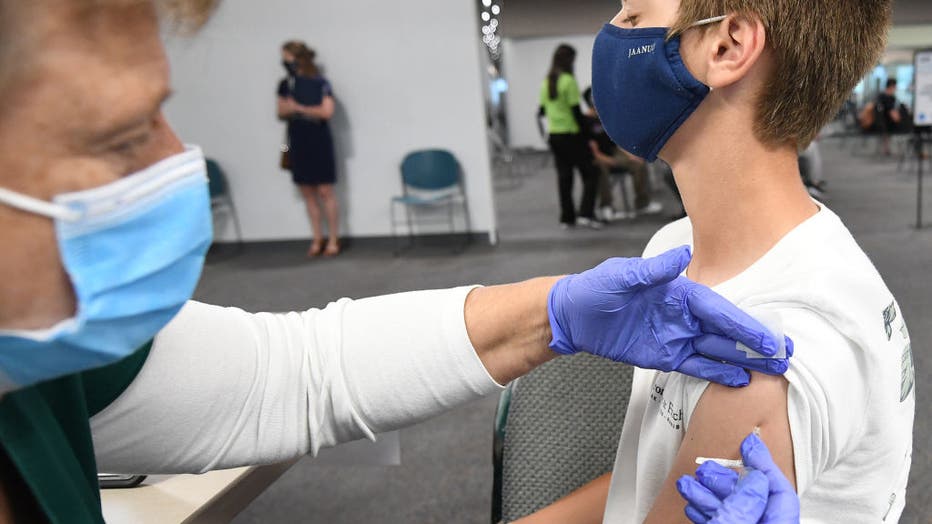Teens should get COVID-19 vaccine, CDC director says, citing hospitalization rates
WASHINGTON - The director of the U.S. Centers for Disease Control and Prevention urged parents to get their children 12 and older vaccinated against COVID-19, pointing to an increase in hospitalization rates among the age group — including some who required intensive care.
"I am deeply concerned by the numbers of hospitalized adolescents and saddened to see the number of adolescents who required treatment in intensive care units or mechanical ventilation," CDC Director Rochelle Walensky said in a statement Friday. "Much of this suffering can be prevented."
Walensky issued the statement alongside a study released that analyzed COVID-19 hospitalization rates among those between the ages of 12 and 17. It found that adolescent hospitalization rates from COVID-NET "peaked at 2.1 per 100,000 in early January 2021, declined to 0.6 in mid-March, and rose to 1.3 in April."
"Among hospitalized adolescents, nearly one-third required intensive care unit admission, and 5% required invasive mechanical ventilation," according to the CDC’s most recent Morbidity and Mortality Weekly Report.
While virus hospitalization rates for adolescents increased, the same rates those 65 and older stabilized — likely because of high vaccination rates among the older age group.
No adolescent deaths from COVID-19 occurred during that time period, the CDC added.

FILE - A nurse gives a teenager a dose of the Pfizer-BioNTech COVID-19 vaccine at a vaccination clinic at Health First Medical Centre in Melbourne, Florida, on May 17, 2021. (Photo by Paul Hennessy/SOPA Images/LightRocket via Getty Images)On May 12,
In May, the Pfizer-BioNTech COVID-19 vaccine was cleared for people ages 12 and up as part of an expanded emergency use authorization already given by the Food and Drug Administration and followed the CDC’s sign-off. It was based on the safety and efficacy of the vaccine in adolescents following clinical trials.
Health authorities are currently probing a small number of U.S. teen boys who reported heart inflammation after COVID-19 vaccination, though the link to the vaccine has not been proven. The CDC said it continues to urge that everyone 12 and older gets vaccinated against COVID-19, which is far riskier than the vaccine.
While speaking live during Thursday’s White House COVID-19 response briefing, Walensky again pointed to the CDC’s new report and said the findings "force us to redouble our motivation to get our adolescents and young adults vaccinated."
She urged parents who have questions to speak with their child’s health providers, or with local health departments or pharmacists.
"I strongly encourage parents to get their teens vaccinated, as I did mine," she said.
To date, nearly 51% of the total U.S. population has received at least one dose of a vaccine and 41.2% of the total population are fully vaccinated, CDC data shows. Among American adults, 63% have at least one dose and 53% are fully vaccinated.
Earlier this month, the CDC noted that young adults also accounted for one-third of COVID-19 hospitalizations, "most of whom have not yet been vaccinated." Johns Hopkins University also noted that it was seeing an uptick in virus hospitalizations on its campuses among 18 to 49-year-olds.
"During the winter surge, for example, 15 to 20% of our patients were in the 40s and younger, but in May, it’s actually been 30% of our patients who are hospitalized have been under age 40," Dr. Rebecca Dezube of Johns Hopkins told FOX Television Stations on May 17.
As a result, the Biden administration has continued to push its vaccination campaign in an effort to reach 70% of adults with at least one shot by the Fourth of July.
There has also been good news regarding the COVID-19 response in the U.S. amid the millions who have received their shots. Walensky celebrated the overall recent decline in new COVID-19 cases, hospitalizations and deaths, a stark contrast compared to the peaks reported earlier this year.
The U.S. seven-day average of new COVID-19 cases was 15,600 per day, a 94% decrease from the peak in January. The seven-day average of new hospital admissions was also about 2,570, a decrease in 85% since Jan. 9, Walensky noted.
The seven-day average of daily virus deaths declined to a new low of 363 per day, a decrease of more than 16% from the week prior.
"We can all agree these trends are going in the right direction," she said.
RELATED: Daily US COVID-19 cases fell below 10K this week
This story was reported from Cincinnati. The Associated Press contributed.

